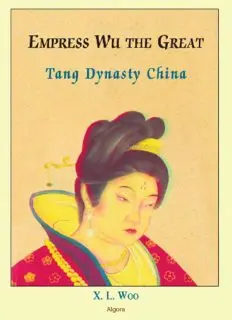
Empress Wu the Great: Tang Dynasty China PDF
Preview Empress Wu the Great: Tang Dynasty China
E W G mprEss u thE rEat E W G mprEss u thE rEat t D C anG ynasty hina X. L. Woo Algora Publishing New York © 2008 by Algora Publishing. All Rights Reserved www.algora.com No portion of this book (beyond what is permitted by Sections 107 or 108 of the United States Copyright Act of 1976) may be reproduced by any process, stored in a retrieval system, or transmitted in any form, or by any means, without the express written permission of the publisher. Library of Congress Cataloging-in-Publication Data — Woo, X. L. Empress Wu the Great / X L. Woo. p. cm. ISBN 978-0-87586-660-4 (trade paper: alk. paper) — ISBN 978-0-87586-661-1 (case laminate: alk. paper) — ISBN 978-0-87586-662-8 (ebook) 1. Wu hou, Empress of China, 624-705 2. Empresses—China—Biography. 3. China—History—Tang dynasty, 618-907. I. Title. DS749.42.W8W66 2008 951’.017092—dc22 [B] 2008031633 Front Cover: Empress Wu the Great Printed in the United States tablE of ContEnts prEfaCE 1 ChaptEr 1. oriGins of a futurE sovErEiGn 5 The Wu Family 5 Wu’s Father Rises from a Merchant to a Nobleman 5 Mr. Wu Marries Up 7 Mr. Wu Becomes a Governor 9 Mr. Wu Leaves His Family Bereft 10 The Establishment of the Tang Dynasty 11 Mr. Wu’s Sponsor Becomes the Second Emperor of the Tang Dynasty 20 Empress Changsun and a Few of the Courtiers 25 ChaptEr 2. miss Wu bEComEs an impErial ConCubinE 31 The Sons Vie for the Succession 33 Selecting the Crown Prince 36 Introduction to the Crown Prince 38 Sent to a Nunnery 44 The New Emperor Reigns 45 Empress Wang Brings Wu Back to the Palace 49 Empress Wang and Concubine Xiao Unite against Concubine Wu 51 Concubine Wu Fights Back 53 The Courtiers Take Sides 54 Empress Wang and Her Supporters Take a Mis-Step 57 Empress Wang and the Crown Prince are Removed 58 Empress Wu the Great Wu Becomes Empress 60 ChaptEr 3. from EmprEss to EmprEss DoWaGEr 6 3 Advancing Supporters and Annihilating Opponents 63 Taking Part in Politics 66 The Pleasures of Traveling 85 Relationship With Her Children 89 ChaptEr 4. thE EmprEss DoWaGEr ConsoliDatEs hEr poWEr 97 Standing at the Top 105 View from the Summit 108 ChaptEr 5. rEbEllions 123 The Largest Rebellion 123 The Rebellions of the Princes Li 131 Other Rebellions 136 Abuse of Power at Every Level 141 ChaptEr 6. piCkinG favoritEs 149 Naming a Successor 149 Empress Wu’s Favorites 151 ChaptEr 7. rElations With othEr nations 159 Tibet 159 Korea 162 The Tujue Clan 166 Japan and Arabia 171 ChaptEr 8. famous lEGEnDs about EmprEss Wu 173 Face Reading 173 Flowers Blooming in Winter 174 Other Legends 174 viii prEfaCE In Europe, the idea of “ladies first” once held sway, and there have been many sovereign queens in Europe’s history. In ancient China there was none of that. The social status of women was low. They were not allowed to do what men were doing and not allowed to interfere with what men were doing, especially politically. They were deemed at best ornaments in men’s life and as reproduction machines to bear offspring for their husbands’ fami- lies. It was their duty was to obey men and please men. Although in some particular families the husband might listen to the wife or might even be henpecked, that was hardly the prevailing trend. By tradition, a woman who did not bear any sons (daughters did not count) for the husband could be divorced for that reason alone. Actually, it was not even a “divorce.” The hus- band could simply return the woman, like a defective product; he could send her back to her original family. The parents could not refuse to take their daughter back. But they were not obliged to welcome her warmly Under such circumstances, it was not easy for a woman to climb all the way up to the throne. Yet one woman did it. Eventually known as Empress Wu Zetian the Great, she became the only female sovereign to rule in her own name in Chinese history. Women occupied a low social status long before her time, the Tang Dy- nasty (AD 618–AD 907); it can be seen in records from the early Zhou Dy- nasty (1121 BC–476 BC), which is as far back as we can really go. The Chinese government boasts that China has an even longer history, going back five thousand years, but the first dynasty they include may be legendary. No ar- cheological evidence has ever been found; there are only references to it in 1
